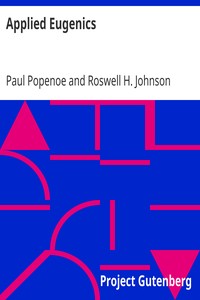Applied Eugenics by Paul Popenoe and Roswell H. Johnson
"Applied Eugenics" by Paul Popenoe and Roswell H. Johnson is a scientific publication written in the early 20th century. The book explores the principles of eugenics, which combines biology and sociology to advocate for societal adjustments that could improve the human gene pool. The authors aim to discuss ways in which society can encourage the reproduction of perceived 'superior' individuals while discouraging those deemed 'inferior,' through various legal, social, and economic means.
The opening of "Applied Eugenics" sets the stage by introducing the foundational concepts of eugenics and its historical context. Popenoe emphasizes the importance of distinguishing between inherited traits and environmental influences, arguing that heredity plays a more significant role in shaping individuals than commonly believed. Through examples involving identical twins and references to a range of scientific studies, the text critiques the notion that nurturing can fundamentally alter one's inherited traits and consequences for societal approaches to improving human health and capabilities. The authors propose a detailed examination of human traits, the significance of hereditary contributions, and the societal implications of eugenics as a scientific and ethical framework. (This is an automatically generated summary.)
Read or download for free
| How to read | Url | Size | |||
|---|---|---|---|---|---|
| Read now! | https://www.gutenberg.org/ebooks/19560.html.images | 1.3 MB | |||
| EPUB3 (E-readers incl. Send-to-Kindle) | https://www.gutenberg.org/ebooks/19560.epub3.images | 1.7 MB | |||
| EPUB (older E-readers) | https://www.gutenberg.org/ebooks/19560.epub.images | 1.7 MB | |||
| EPUB (no images, older E-readers) | https://www.gutenberg.org/ebooks/19560.epub.noimages | 504 kB | |||
| Kindle | https://www.gutenberg.org/ebooks/19560.kf8.images | 2.1 MB | |||
| older Kindles | https://www.gutenberg.org/ebooks/19560.kindle.images | 2.0 MB | |||
| Plain Text UTF-8 | https://www.gutenberg.org/ebooks/19560.txt.utf-8 | 1008 kB | |||
| Download HTML (zip) | https://www.gutenberg.org/cache/epub/19560/pg19560-h.zip | 1.9 MB | |||
| There may be more files related to this item. | |||||
Similar Books
About this eBook
| Author | Popenoe, Paul, 1888-1979 |
|---|---|
| Author | Johnson, Roswell H. (Roswell Hill), 1877-1967 |
| Title | Applied Eugenics |
| Credits |
Produced by Audrey Longhurst, Janet Blenkinship and the Online Distributed Proofreading Team at http://www.pgdp.net (This file was produced from images from the Home Economics Archive: Research, Tradition and History, Albert R. Mann Library, Cornell University) |
| Reading Level | Reading ease score: 56.4 (10th to 12th grade). Somewhat difficult to read. |
| Language | English |
| LoC Class | HQ: Social sciences: The family, Marriage, Sex and Gender |
| Subject | Eugenics |
| Category | Text |
| EBook-No. | 19560 |
| Release Date | Oct 17, 2006 |
| Copyright Status | Public domain in the USA. |
| Downloads | 600 downloads in the last 30 days. |
| Project Gutenberg eBooks are always free! | |

